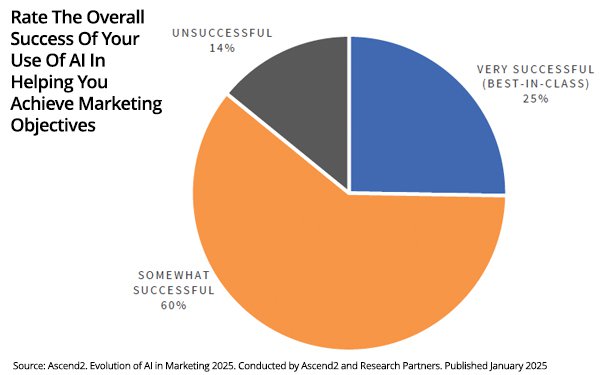
Brands are warming up to AI and are steadily gaining
expertise -- especially in the email area, judging by The Evolution Of AI in Marketing 2025, a study by Ascend2.
Of the firms polled, 60% are somewhat successful at using AI to
achieve their marketing objectives. And 25% say they are very successful, or best in class. Only 14% are unsuccessful.
But they are not using AI as widely as they might. Only
17% have extensively integrated AI across multiple channels, while 39% have applied it in select areas. Another 26% are exploring AI but have not yet implemented it. And 13% have no plans to use AI in
marketing. Finally, 6% are unsure.
Why this hesitation? Because brands face several challenges in adopting AI for marketing:
- High costs of AI tools —
38%
- Data privacy and compliance concerns — 37%
- Integration with existing systems —37%
- Lack of
internal expertise—35%
- Ethical concerns — 32%
- Lack of clear ROI — 25%
- Resistance to change/lack of buy-in — 24%
- Other — 8%
advertisement
advertisement
In addition, brands share these concerns about using Ai in
marketing:
- Loss of creativity and human touch—54%
- Over-reliance on AI—42%
- Ethical issues with data usage — 40%
- Lack of transparency in how AI makes decisions — 35%
- Bias in AI-driven decisions —
29%
- Job displacement fears — 27%
- Other — 6%
Despite these issues, marketers are applying AI in
multiple ways.
Which AI-driven marketing tactics are most effective? The respondents cite:
- Content creation and management — 37%
- Email marketing optimization — 36%
- Social media management and ad targeting — 35%
- Personalization of content — 33%
- Chatbots and conversational AI — 25%
- Predictive analytics for
customer behavior — 22%
- Audience segmentation and targeting — 22%
- Voice and visual search optimization —
20%
- Other—14%
Here are the tools they are using:
- AI-driven content
creation tools — 32%
- Marketing automation platforms with AI features — 29%
- Chatbots and conversational AI platforms —
29%
- Ad targeting and optimization tools — 29%
- Predictive analytics tools — 28%
- Social listening
tools with AI — 24%
- Voice and visual search tools — 22%
- Customer data platforms (CDPs) with AI capabilities —
21%
- None of the above — 18%
- Other — 5%
Summing up, 76% of
marketers agree that firms must adopt AI within the next five years or face a significant competitive disadvantage, and 28% strongly agree. Only 17% somewhat disagree, and 7% strongly oppose this
view.
Ascend2 surveyed 312 marketing decision makers. Of these, 23% are primarily in B2B, 49% in B2C and 28% in B2B and B2C equally.
In addition, 19% of the respondents surveyed
work in firms with more than 500 employees, 30% in companies with 50 to 500 and 51% in organizations with fewer than 50.
The full report can be read
here.